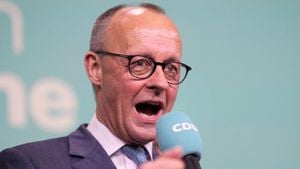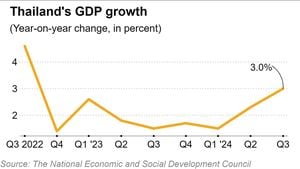Korean financial markets are poised for significant changes as Kim Byung-hwan, the Chairman of the Financial Services Commission, announced plans to resume short selling across all stocks. This move is seen as necessary for restoring market equilibrium and addressing current financial pressures exacerbated by rising interest rates and the aftershocks of the COVID-19 pandemic.
During a press conference at the Seoul Government Complex on February 24, 2025, Kim stated, "This time, if there are no significant issues with electronic systems, I believe it's necessary to resume short selling across all stocks." This marks the first time since the implementation of temporary bans during the pandemic's peak responsiveness to market turmoil.
The previous short selling bans were introduced back in March 2020 after the pandemic initially rattled the stock market, with restrictions only gradually easing to allow temporary measures on select stocks from May 2021 before being reinstated later. Now, the market conditions appear favorable for lifting these restrictions entirely following comprehensive system upgrades aimed at curbing unfair trading practices.
Alongside the discussion on short selling, Kim emphasized the importance of ensuring market-driven principles, particularly concerning interest rates. "The market principles must work when it concerns interest rates. Now is the time to reflect the reduction of the base rate on loans," he remarked, spotlighting the sluggish pace at which banks have adjusted their lending rates even after the Bank of Korea's two reductions of the base rate.
Addressing the stark gap between the recent cuts to the base rate and actual lending rates, he underscored the rationale behind financial regulators’ increased scrutiny on banks. Kim's comments reflect broader consumer frustrations around the persistent high-interest rates on borrowing, which have not yet trended downward alongside the easing of the main bank rate.
Notably, Kim noted the progress made on regulatory improvements, indicating, “The necessary systems for the resumption of short selling have been equipped, and the regulatory framework is set.” This comprehensive reform package aims not only to reactivate trading activities but also to inject confidence and transparency back to beleaguered investors.
Regarding small business support, Kim elaborated on measures aimed at easing financial strains on various sectors negatively impacted by the post-pandemic economic recovery. He signaled the government's commitment to help broaden debt restructuring options, stating, "We will work to provide incentives for banks to manage their household debt appropriately, and monitoring is key to ensuring this." This addresses the urgent need for financial relief measures targeting small business owners and those facing extended financial challenges.
Overall, Kim's firm commitment to reinstatement of short selling, recognition of market fluctuations, and practical support for small businesses indicate not just measures to stabilize the markets but also efforts to restore faith among consumers and investors alike. The prospect for economic balance depends heavily on banks' responsiveness to the announced changes and the systemic reforms being put forth.
With the government’s regulatory checks and well-thought-out intervention strategies, the hope is to realign the financial market with prevailing economic realities, ensuring sustainable growth and enhanced consumer protections. Kim concluded his remarks by reasserting the need for the financial sector to adapt effectively, stating, "It is about time banks reflect these changes to safeguard their role and provide fair support to all sectors of the economy."



